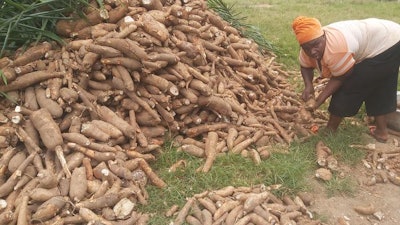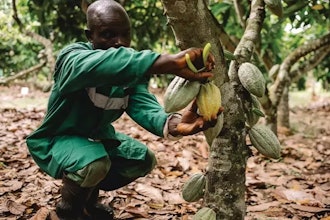
BIRMINGHAM, England — Aston University will help one of the world’s largest cassava processors develop a sustainable and faster way to dry its crops.
The university has entered a knowledge transfer partnership with the Tropical Starch Company, Ghana’s leading cassava processing business.
According to the UN Food and Agriculture Organization, the country is the second-biggest consumer of cassava and contributes to almost a quarter of the country’s agricultural gross domestic product.
Despite its popularity, cassava is difficult to process, since it needs to be thoroughly cleaned, mashed, sieved, dried and packaged.
Currently, the Tropical Starch Company uses industrial uses bin dryers, which need electricity or fossil fuels to generate heat and can only dry one crop per production line. They are expensive to run, and because it is hard to regulate their temperatures, sometimes products are overcooked or discolored.
A KTP is a three-way collaboration between a business, an academic partner and a highly qualified researcher, known as a KTP associate. The U.K.-wide program helps businesses improve their competitiveness and productivity through the better use of knowledge, technology and skills. Aston University is a sector leading KTP provider; 80% of its completed projects being graded as very good or outstanding by Innovate UK, the national body.
The aim of the KTP is to develop an integrated drying device which can operate off-grid, using several different technologies. Aston University will develop an off-grid, solar-powered drying device that is faster, temperature-controllable, uses less energy and can process bigger volumes of raw cassava.
Augustine Fiifi Amoah, who is a supervisor at the company said, “We already have the customers demanding it and so we are praying that we will be able to meet demand. If we could produce 20 tons a day we would be so happy. We have the market, we just need the product."
Although some of these technologies are already developed individually, the way they will be integrated will be new. In particular, data needs to be collected to design and optimize the system, which will be completed with computer simulation modeling. This will require expertise in several fields, including modular design, desiccant drying techniques — where desiccant materials are used in a piece of industrial equipment to eliminate water — energy systems, post-harvest technology and food engineering.
The project is supervised by Dr. Ahmed Rezk, senior lecturer in mechanical engineering from Aston University’s College of Engineering and Physical Sciences and an expert in thermal systems, whose mainstream research is in sustainable and zero-carbon heating and cooling technologies, in collaboration with Dr Tabbi Wilberforce Awotwe, a lecturer in engineering who specializes in design optimization of mechanical systems and energy storage modeling.
“The main goal of our research is to find more efficient and green ways of heating and cooling. They are two sides of the same problem, both requiring energy," Rezk said. "If we devise a good heating method through this project it could have implications for cooling methods in other countries as well.”
Dr. Wilberforce Awotwe, who is based at Kings College London and has previously conducted research at Aston University, added “I’m a Ghanaian myself and my vision for this project goes beyond delivering work packages. If we can get this done we will support many companies in this field, not just one, and address the issue of young people leaving the countryside in search of employment. The long-term impact on the community is the most important thing.”
The project will also involve Professor Robert Sarpong Amoah and Dr. Fatimah Abubakar Von from the University of Cape Coast, Ghana. In addition, a KTP associate will be recruited to work at the company’s main site in Abura-Dunkwa, Ghana.
Once the system has been agreed, the Tropical Starch Company will collaborate with a local fabrication partner, First Product Enterprise Limited, to construct and test the system. Local farmers will later be trained to use the new food drying practices and it is expected that the final dryer will use either sustainable or scrap local materials.
The two-year project will run until January 2026.






















